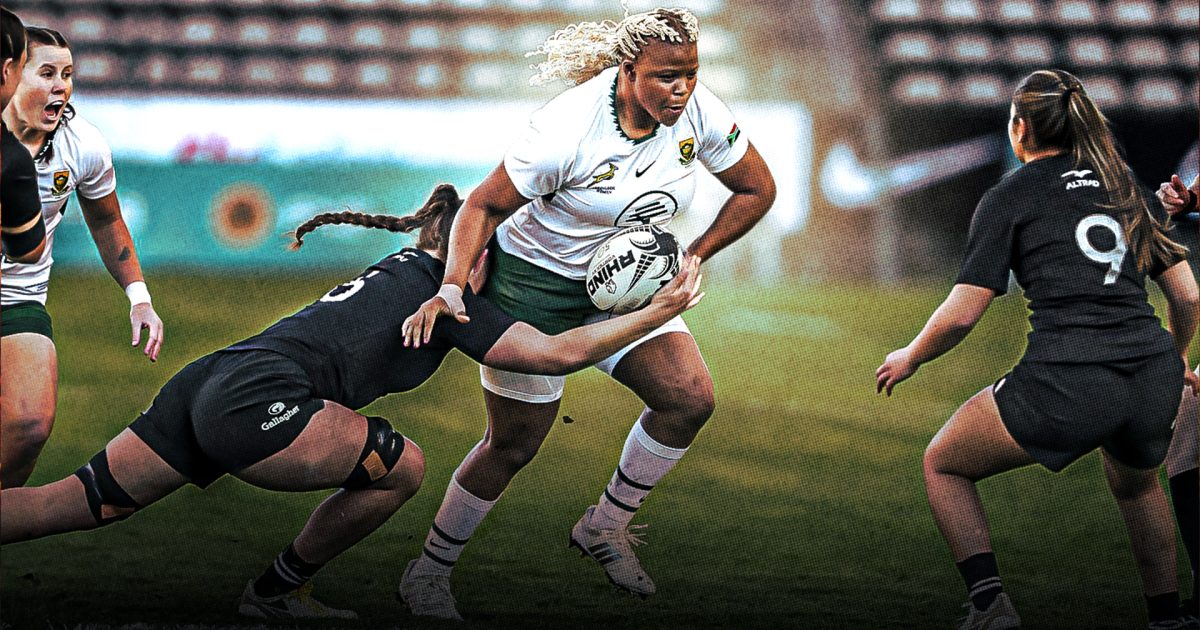Aseza Hele: The Springbok 'sweetheart' with a 'monster' inside

In her WhatsApp profile picture, Aseza Hele looks immaculate. There isn’t a crease in her blazer or matching white thigh-high dress. Her baby blue shoes pair perfectly with her clutch bag.
Her lips, stretched in a broad smile, are bright red, the same colour as the roses behind her, while her hair falls past her shoulders in manicured curls.
She speaks with a light touch and seems on the constant edge of a giggle. She sincerely, and accurately, describes herself as a “sweetheart” who always tries to brighten every room she enters. It’s no wonder a youth team netball coach nicknamed her “Blommie” which means flower in Afrikaans.
Yet on a rugby field, something flicks. Elite athletes have long spoken of the phenomenon of white line fever, describing the shift from mild-mannered civilian to wild-eyed competitor once they enter the playing area. But even by most standards Hele’s transformation is staggering and would rival Dr Jekyll’s.
“I’m a sweetheart,” she says, “But when I play, you see the monster on the field. I cannot explain how I get to that point.”
Hele is a menace on the pitch. She clatters into contact at every opportunity, running over would-be tacklers or thumping opposition ball-carriers with the enthusiasm of a Viking berserker.
Her physicality at the base of the Springboks pack has helped drive the team’s climb up World Rugby’s rankings and she is one of the group’s most potent weapons; she’s scored 13 tries from 28 games and, of all the forwards in the current group, has the most points to her name.
She laughs when searching for an explanation for all this aggression. “When I watch myself, I really don’t know that person I see on the TV,” she explains. “I remember the first time I saw the highlights, I thought, ‘That can’t be me.’
“It was actually quite shocking because you don’t believe that you can be like that. I’ve got a sweet voice. People often tell me I’m too nice. I’m just a baby. When I meet people in the street or in the shopping centre they tell me, ‘You’re so sweet in real life’.
“But I now like what I see. It’s not that I become a different person. I become a different version of myself. Who I am on the field is me. It’s a part of me. It’s good that I can let that part of me out. I think it’s important to show people that women and girls can be more than just one thing.”
Hele resonates with the message espoused by the American superstar, Ilona Maher, who has challenged stereotypes about women in sport by embracing her muscular build while advocating for body positivity.
“She’s an inspiration,” Hele says. “She says that we mustn’t be ashamed of ourselves. We can be strong and beautiful. I don’t know if I’m a role model but if I am, that’s amazing. I hope people look at me and believe that they can be more than just one thing in life.”
Hele credits her resilience to her upbringing. Born in KwaDwesi, a township in Gqeberha on South Africa’s Eastern Cape, she and her sister lost their parents while still at school. They were then taken in by both their paternal and maternal grandmothers, Joyce and Zodwa.
“They were incredibly strong women,” Hele says. “They stepped up and gave us everything. I always say I’m my granny’s daughter. My mom was around, but she worked far away. It was my granny who raised me. She taught me discipline and how to be soft, but also when to be strong.”
Joyce passed away earlier this year, and while she never watched her granddaughter live – “she always wanted to break the TV when I got tackled and said she’d run onto the pitch if she saw me get hurt in person” – she was fiercely proud of the player and the woman Hele became.
That strength that Hele speaks of, that she exhibits every time she takes the field, doesn’t come from a place of rage but of love.
“When I’m playing, I’m thinking of my sister. My nephews. My granny. I’m doing it for them,” she says. “I’m thinking of all of South Africa and everyone who can’t do what I do, who isn’t as lucky as I have been. I want them to see that their support isn’t for nothing.”
She pauses for a minute. Her lightness gives way to introspection: “Even when it’s the 80th minute and I have to make another tackle, I think of them. That’s where the power comes from.”
This is why she insists that she is not seeking a move abroad. She is currently one of only two Springboks who play their club rugby with the Boland Dames. She has had a stint at Harlequins in England and would no doubt add value to any team around the world.
The Bulls Daisies in Pretoria, the only professional women’s outfit in South Africa, have shown interest, but Hele is staying put.
She’s finishing an online degree to become a foundational teacher, adding to the juxtaposition of her warrior persona on the pitch. “I’d never be the same with little children!” She jokes. “When I retire one day I think I’ll leave the monster behind me.”
She’s not there yet. She’s only 30 and eyeing up a leading role at this year’s World Cup. “I’m focussed and hungry,” she adds, her tone darkening as the beast inside rises to the surface.
“We’re a better team than we were last time [in New Zealand in 2022 where South Africa lost all three group matches]. We’re confident. We’re ready. We’re not going there to make friends and be nice.”
She may be called Blommie, but this flower comes with thorns.
We've ranked the best women's rugby players in the world, from 50 - 1! View the Top 50 now

























.png)


